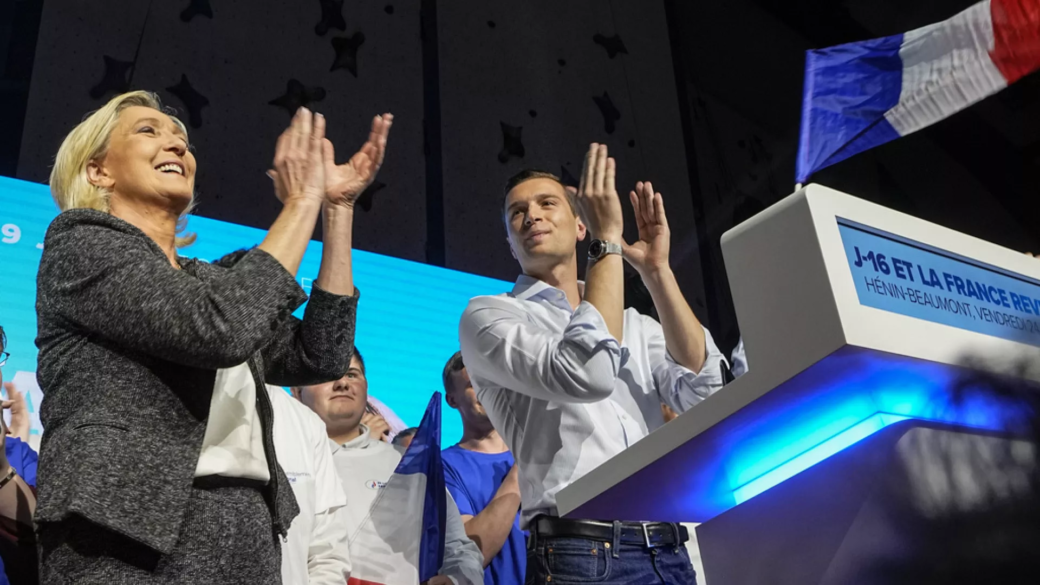
Sympathisers, journalists and politicians flocked to the French town of Hénin-Beaumont on Friday to see the darling of the far right Jordan Bardella.
It’s not every day the sleepy town of Hénin-Beaumont in northern France sees a sea of suits taking over its small train station.
It’s hard to imagine that only a 15-minute walk away, thousands of people have gathered at the local sports hall to see the darling of the far-right, European election candidate Jordan Bardella and the former National Rally leader, Marine Le Pen.
At the front of the long line snaking around the neighbourhood stand Erwann, Matheo and Cyril, 17 years old.
The schoolboys couldn’t wait for class to finish to see their favourite politician.
“Jordan Bardella attracts younger voters because he is charismatic and you see yourself in him”, said Matheo, puffing on his e-cigarette.
“Jordan gave politics a breath of fresh air and I think he’ll be around for a long time,” chimed in Erwann, who said the 28-year-old National Rally leader had sparked his interest in French politics.
With more than 1 million followers on TikTok, Jordan Bardella is the third most-followed French politician on the platform, highlighting his popularity with younger voters.
But not all of the boys’ peers approved of their political outing.
“I think a lot of young people are influenced by their parents who still think the far-right automatically means racism and antisemitism but it’s no longer the case. The National Rally is not what it used to be 20 years ago,” explained Cyril.

The far-right party previously led by Marine Le Pen, has spent years trying to appeal to mainstream voters and de-demonising its xenophobic past.
In 2022, Le Pen stepped down as the party’s president and elected her protege, Jordan Bardella, who joined the party as a teenager.
Many in the crowd – even the staunchest supporters of Le Pen – agree with the choice.
Francine, 75, has voted for the National Rally for more than 40 years. She believes the 28-year-old is the right successor.
“He is young, dynamic and seems to know what he wants. But I have to say his campaign program is lacking when it comes to helping disabled people” said Francine, one of the few to critique the candidate’s EU campaign that evening.
One thing is for sure, Marine Le Pen’s choice is reaping its benefits – Bardella is crushing the polls with 33% of voting intentions according to recent polls compared to 16% for Macron’s Renaissance party, led by Valérie Hayer.
Taking the stage as the crowd chants his name, Bardella unsurprisingly attacked French President Emmanuel Macron and Prime Minister, Gabriel Attal, who he called “the biggest liar in France.”
During his speech, Bardella urged the public to vote in the upcoming EU elections to defend “the identity of France against a flood of migrants”.
The choice of the town of Hénin-Beaumont for the campaign rally is not an insignificant one. It’s one of the historic bastions of the far right.
A major coal mining centre until the end of the 1980s, the town and more broadly Pas-de-Calais region suffered deeply from deindustrialisation and recorded some of the highest unemployment rates in France.
Immigration also has a strong resonance in the region as dozens of migrants try to leave the port city of Calais to reach the British coast.
Jordan Bardella, who presents himself as the candidate who loves “France and the French”, has built his campaign around these themes.
An unexpected shakeup in the EU far-right
Just as France’s far right is poised to make big gains in the June 9 EU elections, a spat between the German far-right party Alternative for Germany (AfD) could rain on their parade.
The National Rally decided to exclude the AfD from their Identity & Democracy faction (ID) in the European Parliament on Thursday.
The decision came after the German lead candidate, Maximilian Krah, told the Italian newspaper La Repubblica that, just because a person had been a member of the SS, they were “not automatically a criminal.”
The unexpected shake-up means new alliances need to be made.
“We’re two weeks away from the elections and the field of possibilities is opening up to us,’ said Thibaut François, an MP in charge of European affairs for the National Rally.
He insisted the party’s first objective is to expand the ID group, mentioning “promising talks” with Vox, a Spanish nationalist party part of the European Conservatives and Reformists Group (ECR) group in the EU parliament.
ID is expected to see its numbers swell in the elections thanks to an influx of far-right MEPs from Dutch Geert Wilder’s Freedom Party and the rising Chega party from Portugal.
The second strategy is to build a “blocking minority of 135 MEPs to vote against texts such as the Migration Pact and the Green Deal,” said François in an interview with Euronews.
But the MP admits the possibility of a large far-right merger with ECR is “complicated.”
The ECR is considered to be somewhat more moderate and clashes with ID’s views on how to deal with Russia. Both groups tried to merge a few years ago but failed.
The ECR consists of Italian Prime Minister Giorgia Meloni’s Brothers of Italy party and Poland’s Law and Justice (PiS), among other parties.
But the centre-right including Commission President Ursula von der Leyen believes that some of ECR’s MEPs (mainly Meloni’s) can be tempted to work together.
An option that is impossible for the National Rally, who refuse to work with Von der Leyen.
“One thing is for sure: there will be a few surprises after the June 9 election,” whispered Alexandre Loubet, the campaign director for Jordan Bardella.



